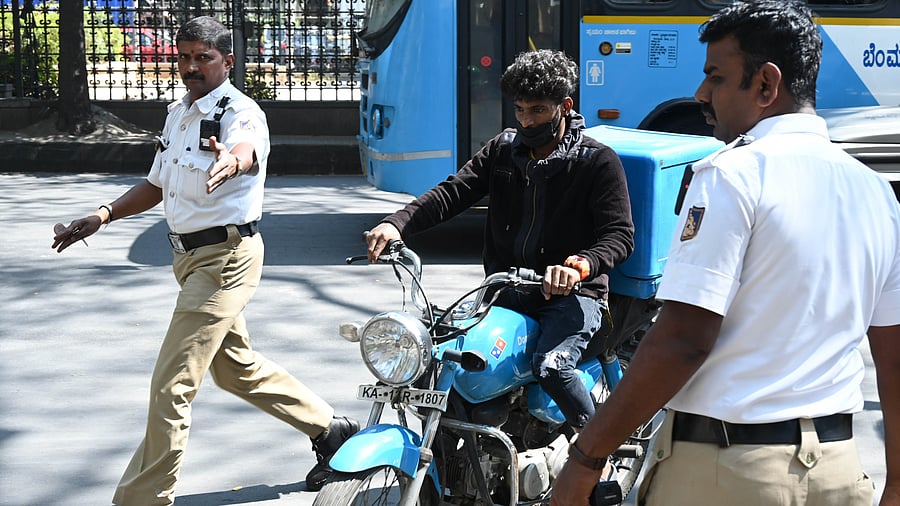
Traffic police fine a food delivery executive for riding without a helmet.
Credit: DH FILE PHOTO
Bengaluru: In an intensified crackdown on traffic violations, more traffic police officers have been observed booking vehicle users and collecting spot fines during on-the-road enforcement drives.
So far, several thousand cases have been registered as part of these drives, which authorities say are aimed at increasing compliance with traffic rules and addressing the massive backlog of unpaid fines.
The violations targeted in these efforts include wrong-way driving, parking on footpaths, riding without helmets, auto-rickshaw drivers refusing to take passengers, triple riding on two-wheelers, and drivers not wearing seat belts.
On Tuesday alone, traffic police in the eastern division registered 1,122 cases of traffic violations, collecting over Rs 5.6 lakh in fines. The previous day, they registered 908 cases and collected Rs 4.54 lakh.
Similarly, the southern division of the traffic police registered 2,163 cases of various violations on Tuesday.
Since July 1, police have also been booking drivers for using high-beam headlights in a statewide enforcement campaign.
Alok Kumar, ADGP (Traffic and Road Safety), Karnataka, stated that these efforts are intended to ensure greater adherence to traffic rules.
“There is rampant wrong side driving and footpath riding observed on the roads. People seem to believe that even if cameras capture their violations, there are no real consequences. Over 90% of traffic fines remain unpaid because people are not settling them,” he said.
He added that these enforcement drives are not new, but have been intensified to "add teeth to technology" and support the efforts of the city’s Intelligent Traffic Management System (ITMS) cameras.
Kuldeep Kumar Jain, DCP (Traffic, East), Bengaluru, told DH that officers on the ground have been instructed to book drivers for visible violations, especially on roads without ITMS cameras.
“We decided on this course of action after receiving numerous complaints, both in public meetings and on social media, about the lack of enforcement against violators. Our primary goal is to curb visible violations, not to clog up traffic,” he said.
